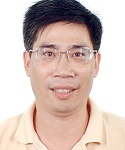| Biography | |
|---|---|
 Prof. Ruijin Wang Hangzhou Dianzi University, China |
|
| Title: Heat transfer enhencement in microchannel filled nanofluid by an alternating applied electric field | |
| Abstract: The heat transfer of nanofluid is a research hotpot in recent decade. The elevation of thermal conductivity of nanofluid is attributed to added nanoparticles. Normally, Brownian motion of nanoparticles, aggregation of nanoparticles and nanolayer at interface of solid-liquid are regarded as the main mechanisms of the improvement of thermal conductivity. In addition, the convective heat transfer can be enhanced by an appled electric field due to the electrophoretic and dielectrophoretic force. Numerical simulations are carried out for heat transfers in microchannel with various electric fields arrangements. The results show that, the heat transfer effect is much better with a vertical electric field. If a sine or square wave electric field is applied, the heat transfer is increased with the frequency at lower frequency, decrease instead at higher frequency. The critical value of frequency is around 90 Hz for sine wave electric field, about 30 Hz for square wave electric field. The underlying mechanism is that, the movement of nanoparticles can not keep up with the alternation of electric field at higher frequency. | |
| Biography: Dr. Ruijin Wang, Male, Born in June 1965, a Professor in Hangzhou Dianzi University. Doctoral Dissertation in 2005: Research on the Mechanism of Diffusion and Mixing in the Microchannel Flow and Micromixer. Postdoctoral research work in Zhejiang University: Mass and Heat Transfer in Microscale under applied Electric and Magnetic Field. Senior visiting scholar in CSI of TU Darmstadt in 2013,Qld MNC of Griffith University 2017-2018 and Bharti School of Engineering in Laurentian University in 2019. More than 100 publications have been published in peer-review journals, such as Int J Heat Mass Transfer, App Therm Eng, Sensors and Actuators B, Chaos Soliton Fractal, etc. He have won two science and Technology awards of Zhejiang province. His research interests are Microfluidics and Nanofluidics. He is an editorial board member of “Nonlinear Science A”, a geust-editor for a special issue of “Micromachines”. | |
